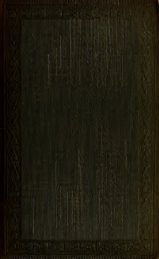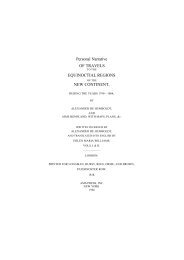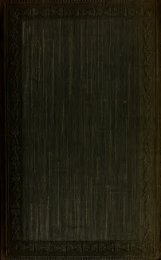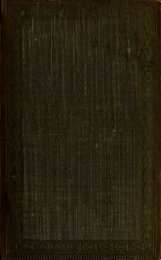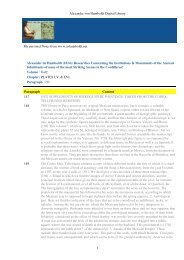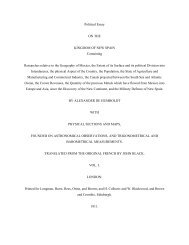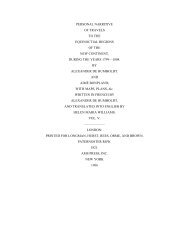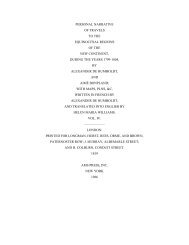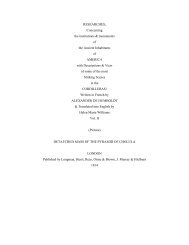See the complete document here
See the complete document here
See the complete document here
You also want an ePaper? Increase the reach of your titles
YUMPU automatically turns print PDFs into web optimized ePapers that Google loves.
i'HiSlCAL COM'EMPLA'IION OF THE UNIVERSE. 141<br />
iiization is most deeply rooted, and from whom we have de«<br />
rived a considerable portion of our early knowledge of o<strong>the</strong>r<br />
nations, and of our views rep:ardinof <strong>the</strong> universe. We have<br />
considered <strong>the</strong> basin of <strong>the</strong> Mediterranean in its characteristic<br />
configuration and position, and <strong>the</strong> influence of <strong>the</strong>se relations<br />
on <strong>the</strong> commercial intercourse established with <strong>the</strong> western<br />
coasts of Africa, <strong>the</strong> extreme north, and <strong>the</strong> Indo-Arabian<br />
Sea. No portion of <strong>the</strong> earth has been <strong>the</strong> <strong>the</strong>ater of greater<br />
changes of power, or of greater or more animated activity under<br />
<strong>the</strong> influence of mental guidance. This movement was<br />
transmitted far and enduringly by <strong>the</strong> Greeks and Romans,<br />
especially after <strong>the</strong> latter had destroyed <strong>the</strong> Phoenicio-Carthaginian<br />
power. That which we term <strong>the</strong> beginning of history<br />
avroke to<br />
is, <strong>the</strong>refore, only <strong>the</strong> period when later generations<br />
self-consciousness. It is one of <strong>the</strong> advantages of <strong>the</strong> present<br />
age that, by <strong>the</strong> brilliant progress that has been made in general<br />
and comparative philology, by <strong>the</strong> careful investigation<br />
of monuments and <strong>the</strong>ir more certain interpretation, <strong>the</strong> views<br />
of <strong>the</strong> historical inquirer are daily enlarged, and <strong>the</strong> strata of<br />
remote antiquity gradually opened, as it were, before our eyes.<br />
Besides <strong>the</strong> civilized nations of <strong>the</strong> Mediterranean which we<br />
have just enumerated, <strong>the</strong>re are many o<strong>the</strong>rs v/ho show traces<br />
of ancient cultivation ; among <strong>the</strong>se we may mention <strong>the</strong><br />
Phrygians and Lycians in Western Asia, and <strong>the</strong> Turduli and<br />
Turdetani in <strong>the</strong> extreme West.^ Of <strong>the</strong> latter, Strabo ob<br />
serves, " <strong>the</strong>y are <strong>the</strong> most cultivated of all <strong>the</strong> Iberians ; <strong>the</strong>y<br />
employ <strong>the</strong> art of writing, and have written books containing<br />
memorials of ancient times, and also poems and laws set in<br />
verse, for which <strong>the</strong>y claim an antiquity of six thousand years."<br />
i have dwelt on <strong>the</strong>se separate examples in order to show<br />
how much of ancient cultivation, even among European na-<br />
tions, has been lost without our being able to discover an;/<br />
trace of its existence, and how <strong>the</strong> history of <strong>the</strong> earliest con-<br />
templation of <strong>the</strong> universe must continue to be limited to a<br />
very narrow compass.<br />
Beyond <strong>the</strong> forty-eighth degree of latitude, north of <strong>the</strong> Sea<br />
of Azof and of <strong>the</strong> Caspian, between <strong>the</strong> Don, <strong>the</strong> Wolga, and<br />
<strong>the</strong> Jaik, w<strong>here</strong> <strong>the</strong> latter flows from <strong>the</strong> sou<strong>the</strong>rn auriferous<br />
*<br />
Strabo, lib. iii., p. 139, Casaub. Compare Wilhelra von Humboldt,<br />
Veber die Urbetcohner Hispaniens, 1821, s. 123 und 131-13G. The Iberiau<br />
alphabet has been successfully investigated in our own times by M. de<br />
Baulcy; <strong>the</strong> Phry^gian, by <strong>the</strong> ingenious discoverer of an-ow-headed<br />
writing, Grotefend ; and <strong>the</strong> Lyciar by Sir Chai-les \ eliovves. CCom.<br />
pare Ross, Hellciiika, bd. i., s. xvi.)



